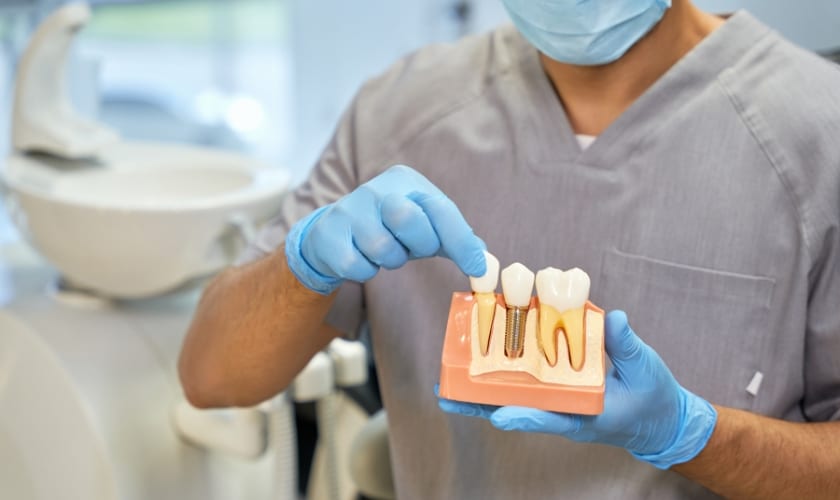Frequently Asked Questions About Dental Implants
By :
Affordable Dentist | November 27, 2023
They say a smile is the universal language, but what if your pearly whites have lost their sheen? Enter dental implants—the unsung heroes of grin restoration! Picture this: a world where gaps are filled, confidence is restored, and smiles radiate with newfound brilliance. Intrigued? You're about to embark on a journey through the frequently asked questions about dental implants, unraveling the mysteries, debunking the myths, and shining a spotlight on the transformative power of a confident smile. So, fasten your seatbelt—your ticket to dental wonderland awaits!
What Are Dental Implants?
Dental implants are artificial tooth roots made of titanium that are surgically placed into the jawbone. They serve as a sturdy foundation for replacement teeth, which can be individual crowns, bridges, or even dentures. Dental implants in Fort Worth have become a game-changer in restorative dentistry, offering a natural-looking and long-lasting alternative to traditional tooth replacement options.
Frequently Asked Questions
Q: Who Is a Suitable Candidate for Dental Implants?
A: Only some people are ideal candidates for dental implants. Good candidates generally have good oral health, adequate jawbone density, and a commitment to maintaining proper oral hygiene. A thorough examination by a qualified dentist or oral surgeon is crucial to determine eligibility.
Q: How Painful Is the Dental Implant Procedure?
A: While the idea of surgery may be intimidating, advancements in technology and anesthesia make the dental implant procedure relatively painless. Local or general anesthesia is administered to ensure comfort during the surgery. Postoperative discomfort can usually be managed with prescribed medications.
Q: How Long Does the Dental Implant Process Take?
A: The dental implant process is a multi-step journey that involves consultation, implant placement, healing, and the attachment of the replacement tooth. On average, the entire process can take several months, allowing for proper healing and integration of the implant with the jawbone.
Q: What Is the Lifespan of Dental Implants?
A: With proper care and maintenance, dental implants can last a lifetime. Regular dental check-ups, good oral hygiene practices, and avoiding habits like teeth grinding contribute to the long-term success of dental implants.
Q: Does Insurance cover Dental Implants?
A: Insurance coverage for dental implants varies. While some insurance plans may cover a portion of the cost, others may not cover dental implants at all. It's crucial to check with your insurance provider to understand your coverage and explore other financing options if necessary.
Q: Can Smokers Get Dental Implants?
A: Smoking can increase the risk of complications during the healing process and may affect the success of dental implants. However, it doesn't necessarily disqualify individuals from getting implants. Smokers considering dental implants should discuss their habits with their dentist to assess the potential risks and explore ways to improve their chances of success.
Q: Do Dental Implants Require Special Care?
A: Dental implants don't require special care beyond regular oral hygiene practices. Brushing, flossing, and regular dental check-ups are essential to maintain the health of the implant and surrounding tissues. Your dentist may recommend specific oral care instructions based on your unique situation.
Q: What Are the Advantages of Dental Implants Over Other Tooth Replacement Options?
A: Dental implants offer several advantages, including improved stability, a natural appearance, and the preservation of jawbone density. Unlike dentures, implants don't rely on neighboring teeth for support, making them a more conservative option. Additionally, implants provide better functionality, allowing individuals to eat and speak with confidence.
Q: Can Dental Implants Fail?
A: While dental implant failure is rare, it can happen. Factors such as poor oral hygiene, smoking, and certain medical conditions can contribute to implant failure. Regular follow-ups with your dentist and diligent oral care significantly reduce the risk of complications.
Q: Is There an Age Limit for Getting Dental Implants?
A: There's no strict age limit for dental implants. As long as an individual is in good health and has sufficient jawbone density, age is not a determining factor. Older adults can benefit from dental implants just like younger individuals, improving their quality of life and oral health.
Dental implants have transformed the landscape of restorative dentistry, providing a reliable and aesthetically pleasing solution for tooth loss. As you embark on this journey or seek to enhance your understanding, these frequently asked questions serve as a compass, guiding you through the key aspects of dental implants. Remember, consulting with a qualified dentist in Fort Worth, TX, is the first step towards achieving a radiant and confident smile.


